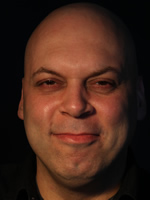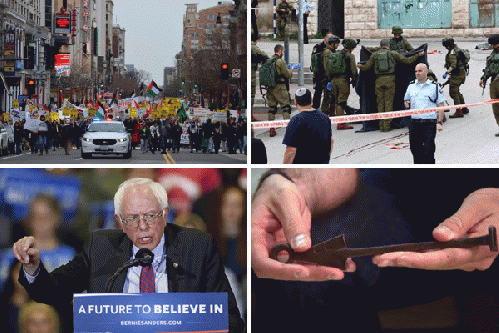Reprinted from Civil Arab
There is absolutely no shortage of drama in being a Palestinian. No matter where one lives, a Palestinian experiences constant ups and and downs. Now, am I saying that a Palestinian's daily life is necessarily more of a spectacle than anyone else's? Yes. Yes, I am. And this week was no exception.
It all started out with a massive protest in Washington DC last Sunday, March 20. I should note here that last Sunday was Palm Sunday, commemorating when Jesus triumphantly entered Jerusalem. I should also mention that Jesus was a Palestinian, along with being the most famous person ever, in the history of the world, ever, of all time. We're a little proud of that.
Back to the protest. Of course, protesting is nothing new in the life of a Palestinian. We are raised on it. By the age of 13, every Palestinian is a professional protester. And we are loud. Sometimes, we don't even care whether or not our chants rhyme.
"1, 2, 3, 4! We don't want your racist war!
5, 6, 7, 8! ... Free, Free Palestine!"
Although ignored by all major media outlets, thousands of Palestinians and their supporters marched from the White House to the Washington Convention Center, where we hung out (quite loudly) on the steps of the building where AIPAC was holding its annual conference. Of course, AIPAC is the American Israel Public Affairs Committee, dubbing itself as "America's Pro-Israel Lobby." It helps to ensure that Israel continues to receive in excess of $3 billion of American taxpayer money every year. By the way, if were to hold off on that aid for just one year, we could rebuild the poisonous water system in Flint, Michigan. Three times over.
In any case, we made our voices heard. Two thousand years after that famous Palestinian victoriously entered the holy city, a mass of Palestinians and their friends emphatically entered the capital city. And while our impact probably won't be as big as his was, we achieved something.
Presidential candidates usually accept invitations to speak at the AIPAC conference as a matter of reflex. It is the go-to spot for political pandering. It's the Studio 54 of groveling. But in this year, a presidential year, one candidate was visibly absent. Bernie Sanders. The Bern. It's hard to explain what that means to a Palestinian. We have come to view politicians fawning over AIPAC as sure to happen as the sunrise. So what Bernie did was pretty exceptional.
And then, while in Utah, he delivered the speech he was going to give at AIPAC. He slammed settlements, labeled Israel's occupation of the West Bank an "occupation," criticized AIPAC for opposing the Iran deal, identified Palestinian poverty, called for the removal of the economic blockade of Gaza, and condemned Israel's "disproportionate responses" against Palestinians. There are some Palestinians reading this now who still don't believe it (Here's the transcript). They are looking around for the hidden cameras. But trust me my brethren, it happened. Those words actually were spoken. By a presidential candidate. By a serious presidential candidate. By a serious Jewish presidential candidate.
I should admit, I am an unapologetic supporter of Bernie. My enthusiasm for him is not complicated. We have had a Muslim president for eight years, and now I think it's time for a Jewish one. It's only fair.
Of course, we also learned something else from Sanders' speech. There is a very short of list of places in America where it's politically safe to deliver a message critical of AIPAC. Those of us in Dearborn welcome Utah to the club.
I enjoyed myself for a couple days, eating ice cream as I flipped through photos from our protest victory and re-reading Bernie's speech. But on Thursday, reality set back in, and we all saw the story of an Israeli soldier executing a wounded Palestinian lying in the street in Hebron. Abed al-Fattah Yusri al-Sharif, who allegedly participated in a knife attack against a soldier (who ended up with light, superficial wounds), was lying in the road, incapacitated from a gunshot wound. Other soldiers were walking around him, as he lay almost motionless, alive, but posing absolutely no threat at all. In a horrendous moment caught on video, an Israeli solider, who just moments before had been standing quite innocuously about 15 feet away, cocked his automatic rifle and fired a single shot into al-Sharif's head, killing him instantly.
In the hours and days following the murder, many around the world expressed all sorts of horror. Palestinians reacted too. We displayed a range of emotions. Rage. Anger. Fear. Anxiety. Concern. Dread. Violation. Loss. Despair. Panic. Terror. But we weren't shocked. No Palestinian watched that horrific video with any level of surprise. We have been telling you that this sort of stuff has been going on for years. We have been screaming to you this kind of thing isn't anecdotal. It is the default state of affairs. My goal as a Palestinian isn't trying to get you to believe my story. I wish it were that simple. No, instead, it's getting you to believe that I'm worthy of telling a story to begin with. Being Palestinian means possessing the quite exhausting daily task of convincing the world that you are, in fact, a human being. It means having to engage in the absurd discussion of whether or not al-Sharif's murder was justifiable.
A petition has been drawn up to honor al-Sharif's murderer, the Palestinian who filmed the murder has received death threats from settlers, and a city in Israel is planning a rally to support the soldier who pulled the trigger. Any discussion of Israel must begin with the clearly illustrated fact that, in the eyes of Israeli society, we Palestinians are subhuman creatures unworthy of the most basic human rights. This is the world we Palestinians live in.
Then came Easter Sunday, a day when Israel openly allows Christians to visit holy sites in Jerusalem, unless of course they are Palestinians living in the West Bank and Gaza. Those Christians, as if they live in some sort of alternate universe, must petition the Israeli state for a special permit to travel between one part of their homeland and another.
On a bright note, CNN and Oren Lieberman reported to us the story of how two Palestinian Muslim Jerusalemite families hold the keys to the Church of Holy Sepulchre, opening and closing it daily. This, of course, comes as no surprise to us Palestinians, as we have known of this for some time. And if anyone is out there asking, "How can the church allow a Muslim family to hold its keys?" Well, they must be doing a good job. They've been doing it for over 800 years. I should also note again that I am no stranger to Palestinian religious harmony, as I am the product of a Palestinian Muslim mother and a Palestinian Christian father. I guess you could say my mom holds the key to my dad's church.
(Note: You can view every article as one long page if you sign up as an Advocate Member, or higher).






